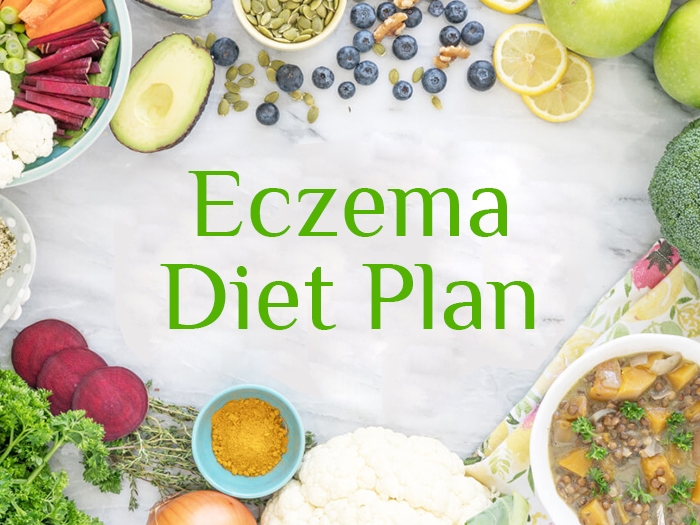Eating certain foods doesn’t appear to cause eczema, although it may trigger a flare-up if you already have the condition. Maintaining an eczema diet plan Or eczema meal plan is key to overall condition management. Not everyone will have the same reactions or flare ups to the same foods.
Contents
Eczema or Atopic dermatitis is a common ailment that leaves the skin inflamed and irritated. Although, the cause of the condition is unknown, there are certain different factors that trigger eczema, one of them being the diet followed by an individual.
Foods play an important role during the treatment of this skin condition, however, it is often overlooked. Most of the affected people and even a few dermatologists consider there is no connection between diet and eczema symptoms.
It is necessary to acknowledge the food choices being adopted while dealing with Atopic Deramtitis. One may not take into consideration but consumption of specific foods may result in eczema flare ups. Treatment of eczema emphasizes on the foods included in the diet.
However, it is essential to acknowledge the specific food sensitivities and food allergies of an individual to determine the most beneficial food for them.
The blog is all you would like to know about the Eczema diet plan for adults, Foods for eczema, Eczema Elimination Diet plan, Eczema diet meal plan, Diet plan for eczema,Seasonal Diet for Eczema-Care and much more.
Eczema Diet: Foods to Eat and Foods to Avoid
1. Manuka Honey

Since the past several years, Manuka honey has been considered as a supplement for healthy and glowing skin. Its anti-inflammatory properties help prevent the symptoms of eczema from worsening and provides relief.
This medicinal honey is claimed to carry high level of enzymes that make it a suitable anti-bacterial agent.
This property is beneficial in alleviating the itchiness caused as a result of eczema. Manuka honey’s rich composition of Vitamin B, minerals and amino acids makes it an appropriate food for internal use and also for external medicinal application.
2. Beef or Chicken Broth
Meat broth is found rich in amino acid glycine that aids in repairing of the skin, damaged as a result of Atopic Dermatitis.
In addition, the food is healthy for the digestive system and eczema conditions. Being rich in minerals, amino acids and collagen, the broth helps heal the skin inflammation and impairs of the digestive system.
It is recommended to cook the broth on slow heat and for longer duration to attain the best quality. Addition of Apple Cider Vinegar is considered beneficial to completely drain out nutrients from the meat.
Also Read: Apple Cider Vinegar for Eczema
3. Cruciferous Vegetables

These vegetables from the Brassicaceae family, including broccoli, cauliflower, bok choy, cabbage, garden cress, brussels sprouts and similar vegetables, are rich sources of antioxidants, vitamins, minerals, Omega fatty acids, phytonutrients, carotenoids, and flavonoids.
The vegetables help manage symptoms of eczema by helping reduce inflammation. Also, high fiber content in these cruciferous foods aids in the removal of toxins from the body that makes them an essential food to treat eczema.
4. Turmeric

The major component of the herb – curcumin makes it a potential antibacterial and anti-inflammatory agent. As a result, turmeric is extensively used to alleviate the inflammation caused by eczema.
Turmeric holds a tonnes of beneficial minerals, fiber and Vitamin B6 because of which it is treated as a curative food source and helps in the reduction of immune response generated by eczema.
5. Green Leafy Vegetables

Apart from the cruciferous class of vegetables, other green leafy veggies, including parsley, oregano and similar are packed with minerals, flavonoids and vitamins that help them reduce inflammation.
Their enzyme and nutrient rich composition offers digestive and restorative benefits. This class of foods manages the overall health of the person by improving their immune system, providing proper nourishment to the body cells, thus, aiding to the betterment of skin health.
6. Beets

The inclusion of Beetroot in the eczema diet meal plan provides the following benefits:
- Helps repair damaged cells
- Enhances the production of red blood cells
- Helps restore essential minerals and carotenoids possessing anti-inflammatory properties
- Stimulates the production of glutathione by reinstating specific enzymes.
- Induces inflammatory skin conditions.
Beets are also rich in fiber content, Vitamin C, antioxidants and phytonutrients called betalains. Betalains are considered as supreme sources for detoxification of body and provide superior anti-inflammatory assistance.
7. Berries
The berries family, including blueberries, blackberries, cherries, raspberries, strawberries, cranberries, and so on, are jam packed with an antioxidant called flavonoid quercetin. The antioxidant plays an important role in preventing the onset of diseases and damage of body cells.
The color of the berries carry their own significance in terms of the nutritional components they possess. These components are beneficial to alleviate inflammation.
In addition to the advantages bestowed on the skin, berries stand tall as a fruit rich in vitamins and minerals helping eczema sufferers nourish their system. The fiber content in the fruit aids in maintaining a healthy gut and helps in the removal of toxins from the body.
8. Apples
Apples turn out to be one of the most beneficial foods in case of eczema like skin ailments. The fruit provides the first line of defense against inflammation and diseases.
Apples are composed of several varied beneficial nutrients including quercetin, minerals, vitamins, pectin, and phytochemicals that collectively support the strengthening of the immune system, detoxification, help reduce eczema-caused inflammation and promote quick healing.
9. Papaya
This low sugar-containing fruit contains a tonne of both lycopene and papain that jointly act as a strong antioxidant and help improve digestion.
Papaya plays a significant role in the following body functions:
- Enhances skin cell regeneration
- Improves immune strength
- Provides anti-inflammatory benefits.
In addition to the pulp of papaya, its skin and seeds are considered to provide therapeutic and nutritional benefits in case of eczema by promoting good digestion.
Eczema Diet Plans for Adults

People affected with eczema are specifically put on a diet rich in antioxidants that is beneficial in alleviating the symptoms of the condition. A dermatologist can recommend you a eczema diet meal plan that is specific according to your eczema symptoms.
The Eczema meal plan may include putting you through strict food habits or eliminating a few foods if you are allergic to them. However, there are certain classes of food that are strictly asked to be avoided in case of Atopic Dermatitis.
Learn more about them in the coming section – Foods to Avoid If You Have Eczema
For now, consider a few common eating plans that are based on principles to help manage eczema conditions:
1. Mediterranean diet

This Eczema diet meal plan focuses on consuming:
- Vegetables
- Fruits
- Omega-3 fatty acid rich fish
- Essential and healthy fats, like olive oil
Sugary sweets and fatty meats are either a complete no or can be consumed in a very small quantity.
2. Anti-inflammatory eczema diet

The diet plan emphasizes on removal of the foods that lead to inflammation of the skin. In addition, it focuses on inclusion of foods that are rich in fiber. Most favorable foods in the meal plan for eczema sufferers include:
- Whole grains
- Fruits
- Vegetables
- Fish
- Olive oil
Processed foods are strictly restricted from consumption.
3. Eczema Elimination Diet
The diet is recommended to those that have been diagnosed positive for food allergies. Certain foods are considered to flare-up eczema symptoms. However, removal of a specific food or a group of foods varies from individual to individual.
In a few cases, there are possibilities that food allergy test may turn out negative. In such a scenario ensure that you keep a check if your symptoms aggravate after consuming something in particular. However, don’t completely cut out on a class of food because you suspect it may be worsening the condition. Prefer consulting your doctor in this case.
4. Seasonal Diet for Eczema-Care
Winters are troublesome for most of those dealing with eczema. The chilly, dry weather worsens the skin condition. Dry, cracked skin during winters is a sign that it needs proper nourishment. Moisturizers, ointments provide an external protection, a strong internal body system is essential to build a protective barrier against irritants, weather changes, and to overcome detoxification concerns.
Make sure that the diet you follow is according to the season. Winter asks for a more of root vegetables and foods that provide warmth.
Winter special Eczema Diet for Adults:
Adults with eczema may experience the rash anywhere on the body,dry skin, and dry climates (especially in the winter). so, elimination diets may help improve eczema symptoms in people with specific food allergies.

1. Stir-fried or Steamed vegetables
Look out for dark leafy greens including kale, spinach, carrots, onions, zucchini and sweet potatoes. You may choose to stir-fry these vegetables in olive oil or you can also prefer to steam vegetables like spinach, kale, beets, and cauliflower. Stir-fried or steamed vegetables facilitates easier digestion.
2. Roasted Veggies
Roasted veggies provide an interesting way to munch on during the winter season. Prepare your special dish by opting for vegetables like cauliflower, carrots, zucchini, sweet potatoes, beets, onions and roast them at a high temperature in the oven.
Prefer using coconut oil or avocado oil for roasting the veggies, as olive oil can’t withstand high temperatures and burns out. Roasted vegetables offer warmth to the body and provide digestion benefits.
3.Soups
Soups are a great way to attain the required nutrition and warmth for the body. Prepared broth is rich in fiber, minerals, vitamins and other essential nutrients, thus, facilitating gut healing properties.
4. Gluten-free Oatmeal and other grains
Wintertime is all about binging on something that provides the body with necessary nutrients and warmth. While the spring and summer mornings may include juices and smoothies, the winter months must go with hot, well-cooked gluten-free oatmeal.
To gain the benefits of antioxidants, you may add some blueberries or even other berries. Drizzling with honey may add to the sweetness and provide certain other health benefits. Try out quinoa and brown rice with your stir-fried, steamed, or roasted vegetables for that wholesome punch of diet.
4 Foods you should avoid in case of eczema

A few foods are commonly ruled out of the eczema diet plan to help control the symptoms of eczema. The listed foods are possible eczema triggers. However, it is not necessary that a class of food that aggravates the condition in a person, may affect the other even; these vary from individual to individual and their symptoms.
Listed are the most common foods to be avoided to keep eczema under control:
1. Fatty Meats
Fatty meats including beef, lamb and sausage, contain high level of saturated fats that may result in inflammation. People with Atopic Dermatitis are recommended to consume fewer or limit their consumption of saturated fat sources, including red meat.
Instead prefer eating omega-3 fatty acid rich cold-water fish such as salmon, tuna, herring and sardines that possess anti-inflammatory properties.
2. Dairy Products
In a few people with AD, dairy products have been found worsening their symptoms. Although, rich in protein, calcium and vitamin D, dairy products like milk, cheese, yogurt, and whey are found to cause lactose intolerance in 20% of the people. You may prefer using raw dairy in place of the commercially available dairy products.
3. Enriched flour products
Refined flour products like pasta and white breads are hard to digest and also possess lesser nutrient proportion in comparison to whole-grain foods. In addition, these foods cause inflammation, thus, aggravating the symptoms. Prefer choosing products made of whole-grains which may contribute to a healthy immune system and digestive health.
4. Sugary Sweets
Limited sugar intake is considered equivalent to controlled Atopic Dermatitis symptoms. Sugary products with added sugars like sucrose, maltose, cane sugar carry less benefits. Instead of sugar-loaded soft drinks, prefer drinking herbal tea or fresh juices. Restrict your intake of sugar in coffee, tea and cereals. It is recommended to reduce your consumption of bakery products and similar prepared foods.






1 Comment
Thomas
3:56 pm . September 7, 2017
Great post! Have a nice day! 🙂